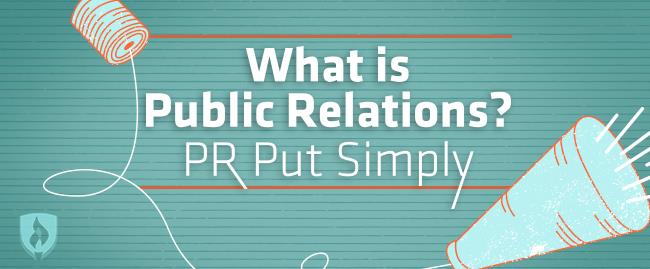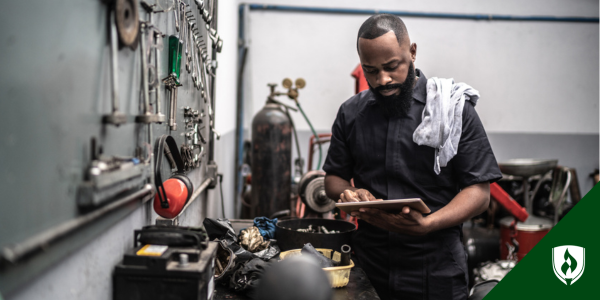
It’s no secret that public relations (PR) is infinitely important for the long-term success of an organization. You know there is good PR and bad PR, and you’ve probably heard someone mention that “all PR is good PR.” But do you really even know what they’re referring to?
What is public relations in the first place?
Keep reading to get a simple introduction to the field of public relations and learn what PR specialists actually do.
What is public relations, anyway?
At its heart, public relations is simply shaping the identity for an organization and sharing this identity with the public. More formally, PR is a strategic communication process that builds mutually beneficial relationships between organizations and their publics, according to the Public Relations Society of America.
PR often focuses on positive and strategic relationships with the media, and now social media. But, don’t get confused. PR is not advertising. Advertising is when a company says how great they are. PR is when the public says how great a company is. It’s not difficult to see why the latter is more powerful.
What do PR specialists do?
PR specialists, sometimes referred to as communications or media specialists, are the professionals hired to create and maintain a positive public image for a client or organization. They are responsible for a wide array of job duties, which will vary depending on the position. But here are some common responsibilities, according to the U.S. Bureau of Labor Statistics (BLS):
- Write and prepare press releases for the media
- Respond to information requests from the media
- Help clients/organizations communicate effectively with the public
- Help maintain their organization’s corporate identity
- Draft speeches and arrange interviews for top executives
- Evaluate advertising and promotion programs to ensure they align with PR efforts
- Monitor public opinion of their clients/organization on social media platforms
Where do PR specialists work?
The great thing about PR is that almost every organization needs it. We used real-time job analysis software to analyze more than 50,000 PR jobs posted over the past year.* The data helped us identify the top industries hiring PR specialists. Here’s what we found:
- Advertising and public relations services
- Colleges, universities and professional schools
- Scientific and technical services
- General medical and surgical hospitals
- Insurance carriers
It’s no surprise that advertising and PR services rank number one in this list. But the remainder of the list is indicative of the variety of organizations seeking PR assistance. So whether you’re interested in working for a firm that represents individuals and companies, or working directly for said individuals and companies, you’ve got options!
What are some in-demand PR skills and characteristics?
Regardless of which industry you choose to seek employment, hiring managers are looking for specifically skilled individuals to fill their PR specialist roles. Our analysis helped us identify some of the PR skills in highest demand:*
- Social media
- Journalism
- Marketing
- Media relations
- Event planning
- Newsletters
- Marketing communications
- Business development
- Market strategy
- Press releases
There are also some common characteristics that many successful PR specialists share. The BLS lists interpersonal skills, organization, problem solving abilities and, of course, written and verbal communication skills as being important on the job. These soft skills are just as important as the technical skills listed above.
What education and experience is needed to work in PR?
Don’t worry if you haven’t mastered all of the technical skills featured in the list above. These are abilities you will acquire after obtaining a formal education. This is typically the first step PR specialists take to launch their career.
In fact, our analysis revealed that nearly 75 percent of employers prefer PR candidates to have a bachelor’s degree.* That being said, there is no standard degree program that employers require. A bachelor's degree in business, communications or journalism could all lay a great foundation on which to build a career in public relations.
However, if you’ve already earned your degree or are working towards it, there are other ways to start honing your skills with real-work experience. Internships, volunteer work and experience with local newspapers and media outlets are all attractive additions to a PR specialist’s resume.
Your guide to business degrees
So, what is public relations? Now you have a basic understanding of what it entails and what it takes to work in the field. But if this introduction has you thinking you might want to pursue a PR position, there’s much more to learn.
A business background can help set you up for success in the public relations field. Learn more about your options in our article: The Beginner’s Guide to Different Types of Business Degrees.
RELATED ARTICLES:
- 7 Best Business Jobs for Extroverts
- 11 Essential Business Skills You Mastered Selling Girl Scout Cookies ... and Still Use Today!
*Burning-Glass.com (analysis of 53,152 public relations specialist job postings, Aug. 1, 2015 – Jul. 31, 2016)




